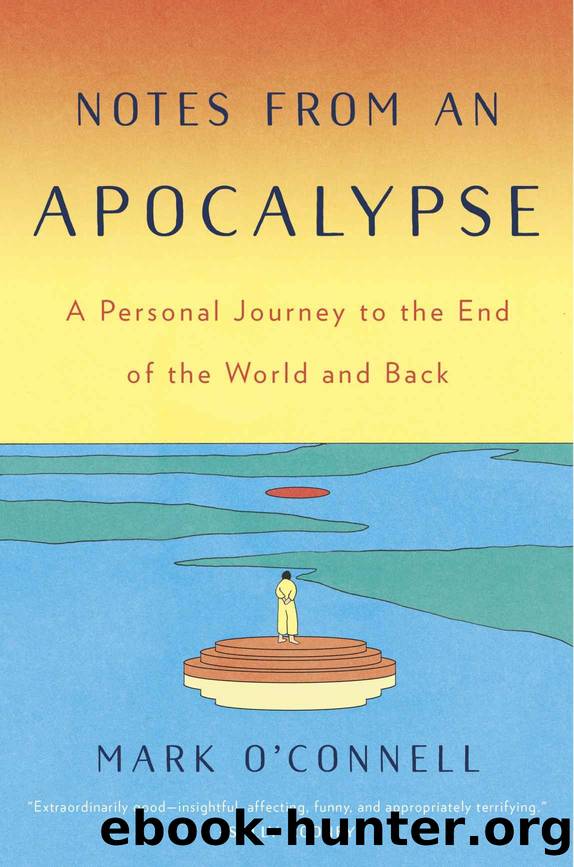Notes from an Apocalypse by Mark O'Connell

Author:Mark O'Connell [O'Connell, Mark]
Language: eng
Format: azw3
Publisher: Knopf Doubleday Publishing Group
Published: 2020-04-13T16:00:00+00:00
* * *
—
At the time of the convention, notwithstanding the occasional plane coming in low toward LAX, Mars was the brightest thing in the night sky above the city. Mars, the planet closest to our own, is no particular distance away. Because the two planets are elliptically orbiting the sun at different rates, the distance varies from 33.9 million miles at its shortest to 250 million miles at its longest. In the late summer of 2018, toward the end of that long and devastating fire season, Mars was closer to Earth—or, and this was somehow more unsettling to consider, Earth closer to it—than at any point in the previous fifteen years. If you were going to set out for Mars, or return from there to Earth, now would be the time.
“To be living here, and not in what we mostly believe is the insupportable there, elsewhere, is to be assimilated into a powerful abstraction, the abstraction of never-ending possibility,” wrote Elizabeth Hardwick. “The American situation is not so much to overthrow the past as to overthrow the future before it arrives as a stasis.”
The chaos and upheaval and entropy of our time, its roiling surface of radical change: Are these not in fact hysterical symptoms of a deep and lethal stasis? Everything is falling apart, coming to an end, precisely because we are unable to believe in the possibility of change. And what is true of the West in general is, as always, spectacularly, gruesomely true of America in particular. At the risk of stating the obvious: nobody is going to make America great again. Nobody even seriously imagines it to be a possibility. America might, it is true, eventually stop outsourcing its manufacturing to China, but if those jobs are ever brought back home, they will return in the form of automated labor. Robots and algorithms will not make America great again—unless by “America” you mean billionaires, and by “great” you mean even richer. Its middle class has been gutted, sold off for scrap. Trump is only the most visible symptom of a disease that has long been sickening the country’s blood—a rapidly metastasizing tumor of inequality, hyper-militarism, racism, surveillance, and fear that we might as well go ahead and diagnose as terminal-stage capitalism.
What Hardwick calls the abstraction of never-ending possibility has its historical precedent in the frontier. Among the many other things it is animated by, abstract and concrete, America is animated by a foundational imperative of expansion. And this much it has in common with another of its great animating forces, capitalism, which exists and thrives through expansion of its own frontiers, through a relentless force of deterritorialization. And it is running out of frontiers; running out of boundaries to obliterate, nature to exploit. The legacy of its monomaniacal pursuit of cheap resources is a devastated planet that may soon be unlivable for vast numbers of its inhabitants.
“Human beings can’t go west anymore,” write Charles Wohlforth and Amanda R. Hendrix in their book Beyond Earth: Our Path to a New Home in the Planets.
Download
This site does not store any files on its server. We only index and link to content provided by other sites. Please contact the content providers to delete copyright contents if any and email us, we'll remove relevant links or contents immediately.
Man-made Catastrophes and Risk Information Concealment by Dmitry Chernov & Didier Sornette(4735)
The Revenge of Geography: What the Map Tells Us About Coming Conflicts and the Battle Against Fate by Kaplan Robert D(3597)
Zero Waste Home by Bea Johnson(3288)
COSMOS by Carl Sagan(2950)
In a Sunburned Country by Bill Bryson(2945)
Good by S. Walden(2913)
The Fate of Rome: Climate, Disease, and the End of an Empire (The Princeton History of the Ancient World) by Kyle Harper(2435)
Camino Island by John Grisham(2383)
A Wilder Time by William E. Glassley(2362)
Organic Mushroom Farming and Mycoremediation by Tradd Cotter(2306)
Human Dynamics Research in Smart and Connected Communities by Shih-Lung Shaw & Daniel Sui(2177)
The Ogre by Doug Scott(2114)
Energy Myths and Realities by Vaclav Smil(2059)
The Traveler's Gift by Andy Andrews(2010)
Inside the Middle East by Avi Melamed(1939)
Birds of New Guinea by Pratt Thane K.; Beehler Bruce M.; Anderton John C(1906)
Ultimate Navigation Manual by Lyle Brotherton(1767)
A History of Warfare by John Keegan(1713)
And the Band Played On by Randy Shilts(1615)
